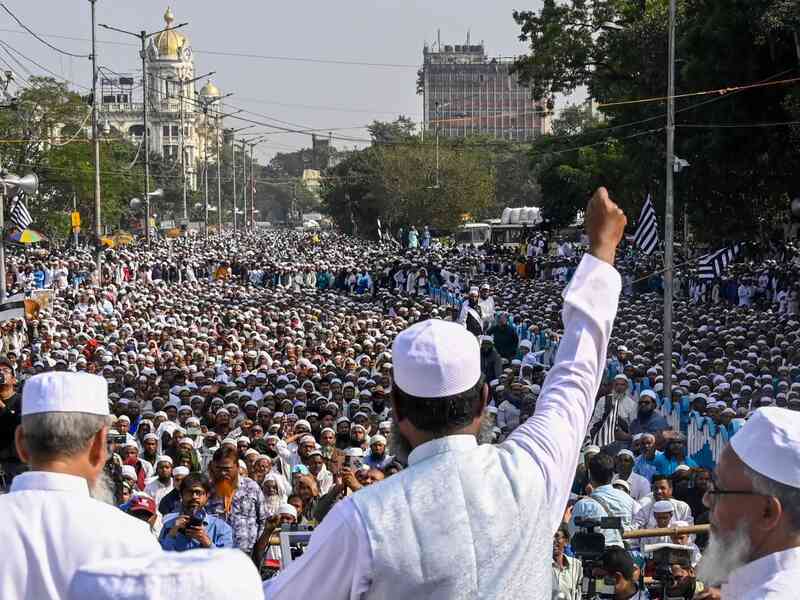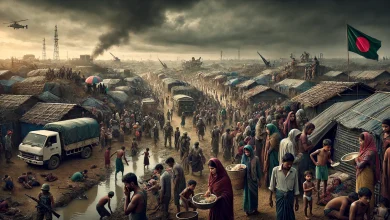India’s Waqf Crisis Ignites Fury
Protests Over Amendment Act Spark Deadly Clashes

India is on edge. Violent protests over the Waqf (Amendment) Act, 2025, have erupted across West Bengal and Jammu and Kashmir, leaving a trail of destruction and death. In West Bengal’s Murshidabad district, three are dead, over 150 arrested, and hundreds displaced as mobs torch vehicles and clash with police. In Kashmir, demonstrations in Srinagar intensify, with barricades and tear gas marking the streets. Central forces, including the Border Security Force (BSF), are now deployed to quell the unrest. Here’s the raw, verified truth unfolding right now.
Murshidabad Burns: A Deadly Flashpoint
At 10 AM on April 11, 2025, in Murshidabad’s Suti and Samserganj areas, protests against the Waqf (Amendment) Act turned lethal. Demonstrators, defying prohibitory orders, blocked National Highway 12, pelted stones at security forces, and set police vans and buses ablaze, according to Reuters. By nightfall, a father and son, Hargobinda Das (74) and Chandan Das (44), were hacked to death in Jafrabad village. A third victim succumbed to a bullet wound in Dhulian. The Calcutta High Court, responding to the chaos, ordered the immediate deployment of Central Armed Police Forces (CAPF) on April 12, with 17 BSF companies now patrolling the district.
Witnesses described scenes of terror. “They broke our door, dragged them out, and killed them,” a family member told BBC, her voice trembling. Over 400 residents, mostly Hindus, fled across the river to Malda, seeking safety. The violence, which began after Friday prayers, saw railway tracks blocked at Nimtita station and a local MP’s office vandalized. Internet services remain suspended to curb misinformation, per government orders.
Kashmir’s Streets Roil with Anger
In Srinagar, Jammu and Kashmir, protests erupted outside the People’s Democratic Party (PDP) office on April 11. Demonstrators, led by PDP workers, rallied against the Waqf (Amendment) Act, waving placards and chanting slogans. Police erected barricades, and clashes broke out as crowds pushed forward. Tear gas filled the air, dispersing protesters by 3 PM, according to AP. No deaths are reported, but injuries to both protesters and police are confirmed. The National Conference plans to challenge the law in the Supreme Court today, April 16, alongside other petitioners like AIMIM’s Asaduddin Owaisi.
“This is an attack on our rights,” a Srinagar protester told Reuters, face covered to avoid identification. The unrest follows years of tension in Kashmir, where the 2019 revocation of special status still fuels distrust. The Waqf Act protests have tapped into deeper fears of state overreach, with crowds growing daily.

The Waqf Amendment: What’s Driving the Rage?
The Waqf (Amendment) Act, passed by India’s Parliament on April 4 and effective from April 8, 2025, overhauls the 1995 law governing Waqf properties—land or assets donated for Muslim charitable or religious purposes. The new law, approved by President Droupadi Murmu on April 5, introduces greater government oversight, allows non-Muslims on Waqf boards, and mandates that donors be practicing Muslims for five years. It also abolishes “Waqf by user” and permits appeals of tribunal orders in high courts, per government press releases.
The Bharatiya Janata Party (BJP), led by Prime Minister Narendra Modi, defends the act as a reform to boost transparency and curb corruption in managing Waqf assets, valued at over $14 billion. Critics, including opposition leaders like Congress’s Rahul Gandhi, call it “discriminatory” and a “violation of constitutional rights.” In West Bengal, Chief Minister Mamata Banerjee has vowed not to implement the law, declaring on April 12, “We do not support this law. It will not be enforced here.” Legal experts, however, note states cannot override central legislation without presidential assent, which is unlikely.
West Bengal’s Political Firestorm
In Murshidabad, a Muslim-majority district, the violence has deepened communal divides. BJP leader Suvendu Adhikari claimed on April 12 that over 400 Hindus fled due to “religious persecution,” likening the situation to the 1990 Kashmiri Pandit exodus. He filed a Public Interest Litigation, prompting the Calcutta High Court’s CAPF order. Meanwhile, Banerjee’s Trinamool Congress (TMC) accuses the BJP of stoking tensions for political gain ahead of elections. TMC MP Saugata Roy said on April 13, “The BJP is exploiting this for votes.”
The unrest has spread beyond Murshidabad. In Kolkata, students from Aliah University rallied on April 11, demanding the law’s withdrawal. In South 24 Parganas’ Bhangar, Indian Secular Front supporters clashed with police on April 14, torching vehicles and injuring one officer, per BBC. Over 150 arrests have been made statewide, with 12 more in Murshidabad on April 13. The state police, backed by BSF, fired four rounds on April 11 to control mobs, though officials deny responsibility for fatalities.

Kashmir’s Legal Battle Looms
In Jammu and Kashmir, the Supreme Court hearing today, April 16, is a focal point. Chief Justice Sanjiv Khanna’s bench will review petitions challenging the Waqf Act’s constitutionality. The All India Muslim Personal Law Board (AIMPLB), which launched a “Waqf Protection Campaign” on April 11, argues the amendments infringe on religious freedoms. Hindu Sena, conversely, supports the law, claiming it protects non-Muslims from wrongful Waqf claims. The court’s ruling could either escalate or defuse tensions in Kashmir, where protests remain non-lethal but volatile.
What It Means Now
The immediate fallout is stark. In West Bengal, Murshidabad’s economy is crippled, with businesses shuttered and transport halted. Over 80,480 Waqf properties in the state, second only to Uttar Pradesh, are now under scrutiny, potentially affecting millions. The displacement of 400-plus residents signals a humanitarian crisis, with no clear timeline for their return. In Kashmir, the Supreme Court’s decision could set a precedent for religious property laws nationwide, impacting India’s 200 million Muslims.
Politically, the BJP faces accusations of marginalizing minorities, while the TMC grapples with balancing its Muslim voter base and Hindu majority sentiments. The violence, described by police as “pre-planned” and fueled by WhatsApp rumors, risks further communal polarization. Internet shutdowns and prohibitory orders, while curbing misinformation, stifle communication and trade. The deployment of 17 CAPF companies underscores the crisis’s severity, with the Ministry of Home Affairs monitoring other sensitive districts like Malda and Nadia.
Voices from the Ground
In Murshidabad, grief and fear dominate. “Who will give me justice?” asked a woman whose family was killed, speaking to The Indian Express. In Kolkata, TMC leader Firhad Hakim urged unity on April 13, saying, “Police will act against all criminals.” On X, verified handle @ANI reported on April 12: “Morning visuals from Dhuliyan, Murshidabad, where people staged a protest against the Waqf Amendment Act. Several vehicles were torched.” The buzz reflects raw anger, with hashtags like #WaqfAct and #MurshidabadViolence trending.
A Nation on Edge
As of 10:27 PM PDT, April 16, 2025, India stands at a crossroads. West Bengal’s streets are tense but quiet, with no new violence reported today. Kashmir awaits the Supreme Court’s verdict, which could either calm or inflame protests. The Waqf (Amendment) Act, meant to streamline property management, has instead ignited a firestorm, exposing deep communal fault lines. With troops patrolling and arrests mounting, the nation braces for what’s next. Stay sharp with Ongoing Now 24.





